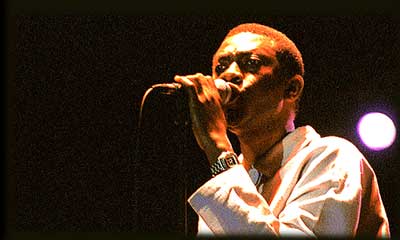|
"If you don't know where you're heading anymore, go back to where you come from." - Youssou N'Dour
With his first U.S. release in six years, Youssou N'Dour hit the road this fall for a North American tour. Marty Lipp caught up with him as he got ready for the second annual Great African Ball in New York City. (November 19, 2000), and talks about how his music has grown from roots-mbalax to international pop.
(Photos by Sitoh)
|
"The Great African Ball is intended to celebrate Senegalese life in New York," he said. "It's a chance for us to say: 'We're here...we are who we are,' and to say to all of New York: 'Come join us in our legendary Senegalese hospitality.'"
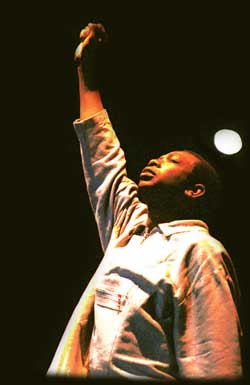 "Doing The Great African Ball in New York has become a terrifically exciting thing for us...The population of Senegalese immigrants in New York, has grown dramatically through the '90s and now I think it is perfectly fair to say that Senegalese immigrants - together with other immigrants from West Africa have begun to mark the personality of New York with our own stamp, our own character. If you go up to Harlem, to 116th Street, you will see this. Just as the Germans, the Irish, the East European Jews, the Chinese and the Italians a hundred years before us, African immigrants now seem to be claiming a place in New York's body politic and, more immediately of course, weaving some incredible strands in the fabric of the economy of the city. The entrepreneurial spirit of Senegalese people, the world-renowned commercial savvy of our people, have revitalized Harlem, there can be no question about that. I'm an outsider, of course, I don't live here. I live in Dakar. But I feel it. And I know it's true.
"Doing The Great African Ball in New York has become a terrifically exciting thing for us...The population of Senegalese immigrants in New York, has grown dramatically through the '90s and now I think it is perfectly fair to say that Senegalese immigrants - together with other immigrants from West Africa have begun to mark the personality of New York with our own stamp, our own character. If you go up to Harlem, to 116th Street, you will see this. Just as the Germans, the Irish, the East European Jews, the Chinese and the Italians a hundred years before us, African immigrants now seem to be claiming a place in New York's body politic and, more immediately of course, weaving some incredible strands in the fabric of the economy of the city. The entrepreneurial spirit of Senegalese people, the world-renowned commercial savvy of our people, have revitalized Harlem, there can be no question about that. I'm an outsider, of course, I don't live here. I live in Dakar. But I feel it. And I know it's true.
Quite the businessman himself, N'Dour said, "I believe that the "renaissance" in Harlem which so many New Yorkers are starting to talk about has been built in no small measure on the resourcefulness of the Senegalese immigrants. As this whole trend has intensified, our own community has built up its own structures - socially, that is. The Senegalese have begun to live more "normally," more "comfortably." More people have regular work. More people are working only one job, not two. Not everyone is driving a livery cab for 19 hours a day. Families are here, more or less intact, with kids in the public schools, with access to some healthcare, and, yes, even with leisure time. These are things which might have been difficult for the Senegalese to have before. The Senegalese are interacting with their American neighbors and, well, they're, 'feeling American.'"
|
"My first European performances with The Super Etoile
were organized by my countryman Moustapha Ndiaye, a
[taxi]driver in Paris, and people he knew in other
countries. They were not show business professionals,
but they found ways to make concerts happen for us.
Without Tapha Ndiaye, and the others, I probably never
would have performed outside of Senegal. My
international
career probably would not have existed. I am in their
debt for this."
|
N'Dour put Senegal on the musical map in 1979, when the then-20-year-old, who had already been singing professionally for a number of years years, formed his first band. Helped by a network of Senegalese taxi drivers in Paris, N'Dour soon made the leap to performing in Europe. When Peter Gabriel heard N'Dour, he invited him to sing on "In Your Eyes" and to open for him on a world tour.
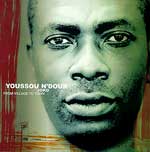 Since then, N'Dour has had his own international hit, the tri-lingual "7 Seconds" with Nenah Cherry, and has released cassettes in Senegal and other albums for the world market. His latest, Joko (The Link), is his first U.S. release in six years. Asked why it took so long, N'Dour said, "It has been a period of intense activity at home in Senegal, where I have built up my business, enhanced my recording studio facilities, developed my radio station and telecommunications investments. And I have had quiet time, too, as a father and head of my family."
Since then, N'Dour has had his own international hit, the tri-lingual "7 Seconds" with Nenah Cherry, and has released cassettes in Senegal and other albums for the world market. His latest, Joko (The Link), is his first U.S. release in six years. Asked why it took so long, N'Dour said, "It has been a period of intense activity at home in Senegal, where I have built up my business, enhanced my recording studio facilities, developed my radio station and telecommunications investments. And I have had quiet time, too, as a father and head of my family."
He said that this is his first album to have an overall theme, that of his own personal journey. "The songs are linked as way stations along a path of musical awakening, an awakening to other musical cultures outside my culture of origin," he explained. "I have been blessed with a long career filled with experiences beyond the imagination of the 13-year-old I was when it started. The songs on Joko represent, for me, a link between my roots as a singer and musician and the inspiration I find today in sounds from around the entire world."
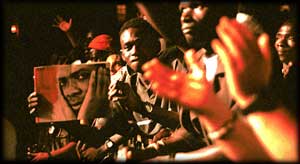 "Songwriting for me tends to be a collective process, with lots of input from my band and from people who come my way with proposals. I usually work from basic lyrical themes which are my own. Then we marry the kernel of the idea of a song with music. It can happen, of course, that it's the other way around, with a musical theme being born first and lyrics following. Since my band and I play live in Dakar four nights a week when we are in the country, we have this great opportunity to see the songs evolve over time, in the "night laboratory" of our club. This is a very agreeable way to make music. I imagine it's how Miles Davis or John Coltrane felt when they were playing every night in the clubs. Not all musicians are fortunate enough to have this constancy any more - the opportunity to play night after night and to refine and to be self-critical. We're lucky in that respect."
"Songwriting for me tends to be a collective process, with lots of input from my band and from people who come my way with proposals. I usually work from basic lyrical themes which are my own. Then we marry the kernel of the idea of a song with music. It can happen, of course, that it's the other way around, with a musical theme being born first and lyrics following. Since my band and I play live in Dakar four nights a week when we are in the country, we have this great opportunity to see the songs evolve over time, in the "night laboratory" of our club. This is a very agreeable way to make music. I imagine it's how Miles Davis or John Coltrane felt when they were playing every night in the clubs. Not all musicians are fortunate enough to have this constancy any more - the opportunity to play night after night and to refine and to be self-critical. We're lucky in that respect."
In the album's opening track, N'Dour sings, "If you don't know where you're heading anymore, go back to where you come from." Asked if that lesson came from his own life, the usually loquacious N'Dour said, "I hope you won't mind a one-word answer: yes."
His predisposition to take on weighty matters, N'Dour said, is part of the tradition in which he was raised, his mother and grandmother having been from the griot caste of musical storytellers.
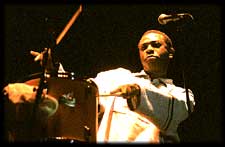 "Music in Africa has never, ever been divorced from everyday life," N'Dour said. "Its social and moral function is a given for all Africans. My songs are usually message-songs in one form or another, even the love-songs tend to be message-songs in the clothing of love-songs." In fact, the title song from his 1990 Set, actually sparked a social movement. The song, he said, was "a call for transparency in public affairs and in business, and also in people's personal lives. The word 'set' in Wolof means 'clean' or 'pure.' Young kids in the ghettos of Dakar, and in the other cities of the country, were crazy for this song, and, for reasons never really clear to anyone, there came a time when they took it upon themselves to take on the task of cleaning up their neighborhoods, clearing away illegal garbage dumps, rehabilitating water-supply facilities that the city government had let go to waste and painting murals on hundreds of city walls with exhortatory messages and the faces of historical figures. 'Set-Setaal' ('Clean - Let's Be Clean') became a rallying cry for good behavior in public, for getting things
"Music in Africa has never, ever been divorced from everyday life," N'Dour said. "Its social and moral function is a given for all Africans. My songs are usually message-songs in one form or another, even the love-songs tend to be message-songs in the clothing of love-songs." In fact, the title song from his 1990 Set, actually sparked a social movement. The song, he said, was "a call for transparency in public affairs and in business, and also in people's personal lives. The word 'set' in Wolof means 'clean' or 'pure.' Young kids in the ghettos of Dakar, and in the other cities of the country, were crazy for this song, and, for reasons never really clear to anyone, there came a time when they took it upon themselves to take on the task of cleaning up their neighborhoods, clearing away illegal garbage dumps, rehabilitating water-supply facilities that the city government had let go to waste and painting murals on hundreds of city walls with exhortatory messages and the faces of historical figures. 'Set-Setaal' ('Clean - Let's Be Clean') became a rallying cry for good behavior in public, for getting things
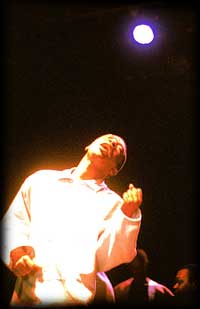 done without waiting for the government to do them, for taking responsibility for one's everyday environment, at the level of your own block."
done without waiting for the government to do them, for taking responsibility for one's everyday environment, at the level of your own block."
His latest effort to spur change in his homeland is The Joko Project, whose goal is to bring down the "digital divide" by building internet access centers and online communities in Africa. "Joko" in Wolof means "link" or "connection." "African culture is heavily weighted toward the retrieval and transfer of information. This is one of the very hallmarks of our culture," N'Dour said. "It follows that African optimism over the potential of the internet to allow African economies to leapfrog industrialization and to aspire to more equitable partnership in the world economy of the future is wholly justified. In Senegal, the human resources are enormous, while natural and technological resources are lacking. Now, in a world economy transformed by the net, new possibilities abound for Senegalese young people able to log on to meet them. I am committed to doing my part to assure that Africa will not be left behind in the post-industrialized world marketplace where the internet is the most meaningful infrastructure."
With his Joko album and The Joko Project, N'Dour is demonstrating the connection between Africa and the west -- whether they are made through modems or riddims.
Buy Youusou N'Dour's "Live in Bercy" at cdRoots
Photos: Barcelona, Spain / July, 2000 / ©2000 Jose Ortega "Sitoh"
Read Opiyo Oloya's review of Joko
Audio clips available at Youssou.com
Listen to Lucy Duran's BBC interview with N'Dour in Real Audio
Comment on this music or the web site.
Write a Letter to the Editor
|


